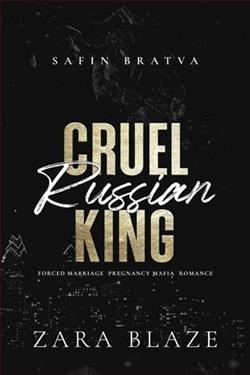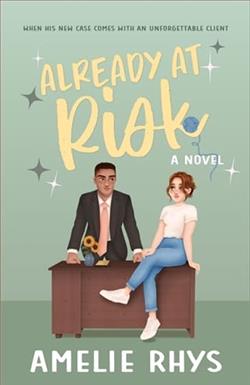Page 13 of Lord of Darkness (Maiden Lane 5)
She’d picked up an ancient leather-bound book of Van Oosten’s commentary on Catullus and now she waved it vaguely. “And …”
“Shop some more, perhaps?” Godric raised his brows. “I may not have seen Sarah for an age, but I do remember her fondness for shopping.”
“Quite.” She looked somewhat subdued as she thumbed the crumbling pages of the book.
“And you?”
“What?”
“Why have you come to London?” he inquired.
Van Oosten exploded in her hands.
“Oh!” She dropped to her knees and frantically began gathering the fragile pages. “Oh, I’m so sorry!”
Godric repressed a sigh as he watched her. Half the pages were disintegrating as fast as she picked them up. That particular tome had cost him five guineas at Warwick and Sons and was, as far as he knew, the last of its kind. “No matter. The book was in need of rebinding anyway.”
“Was it?” She looked dubiously at the pages in her hands before gently laying the mess in his lap. “Well, that’s a relief, isn’t it?”
Her face was tilted up toward his, her brown eyes large and somehow pleading, and she’d forgotten to take her hands away again. They lay, quite circumspectly, on top of the remains of the book in his lap, but something about her position, kneeling beside him, made him catch his breath. A strange, ethereal feeling squeezed his chest, even as a thoroughly rude and earthly one warmed his loins. Good Lord. That was inconvenient.
He cleared his throat. “Margaret?”
She blinked slowly, almost seductively. Idiot. She must be sleepy. That was why her eyelids looked so heavy and languid. Was it even possible to blink seductively?
“Yes?”
“How long do you plan to stay in London?”
“Oh …” She lowered her head as she fumbled with the demolished book. Presumably she meant to gather the papers together, but all she succeeded in doing was crumbling them further. “Oh, well, there’s so much to do here, isn’t there? And … and I have several dear, dear friends to call on—”
“Margaret—”
She jumped to her feet, still holding Van Oosten’s battered back cover. “It simply wouldn’t do to snub anyone.” She aimed a brilliant smile somewhere over his right shoulder.
“Margaret.”
She yawned widely. “Do forgive me. I’m afraid the trip has quite fatigued me. Oh, Daniels”—she turned in what looked like relief as a petite lady’s maid appeared at the doorway—“is my room readied?”
The maid curtsied even as her gaze darted about the library curiously. “Yes, my lady. As ready as ever it can be tonight anyway. You’ll never credit the cobwebs we—”
“Yes, well, I’m sure it’s fine.” Lady Margaret whirled and nodded at him. “Good night, er … husband. I’ll see you on the morrow, shall I?”
And she darted from the room, the back cover of poor Van Oosten still held captive.
The maid closed the door behind her.
Godric eyed the solid oak of his library door. The room without her spinning, brilliant presence seemed all of a sudden hollow and tomblike. Strange. He’d always thought his library a comfortable place before.
Godric shook his head irritably. What is she about? Why has she come to London?
Theirs had been a marriage of convenience—at least on her part. She’d needed a name for the babe in her belly. It’d been a marriage of blackmail via her ass of a brother, Griffin, on his part, for Godric had not fathered the child. Indeed, he’d never spoken to Lady Margaret before the day of their wedding. Afterward, when she’d retired to his neglected country estate, he’d resumed his life—such as it was—in London.
For a year there’d been no communication at all, save for the odd secondhand bit of information from his stepmother or one of his half sisters. Then, suddenly, a letter out of the blue, from Lady Margaret herself, asking if he would mind if she cut down the overgrown grapevine in the garden. What overgrown grapevine? He hadn’t seen Laurelwood Manor, the house on his Cheshire estate, since the early years of his marriage to his beloved Clara. He’d written back and told her politely but tersely that she could do as she wished with the grapevine and anything else she had the mind to in the garden.
That should’ve been the end to it, but his stranger bride had continued to write him once or twice a month for the last year. Long, chatty letters about the garden; the eldest of his half sisters, Sarah, who had come to live with Margaret; the travails of repairing and redecorating the rather decrepit house; and the petty arguments and gossip from the nearby village. He hadn’t known quite how to respond to such a flurry of information, so in general he simply hadn’t. But as the months had gone by, he’d become oddly taken with her missives. Finding one of her letters beside his morning coffee gave him a feeling of lightness. He’d even been impatient when her letter was a day or two late.
Well. He had been living alone and lonely for years now.















